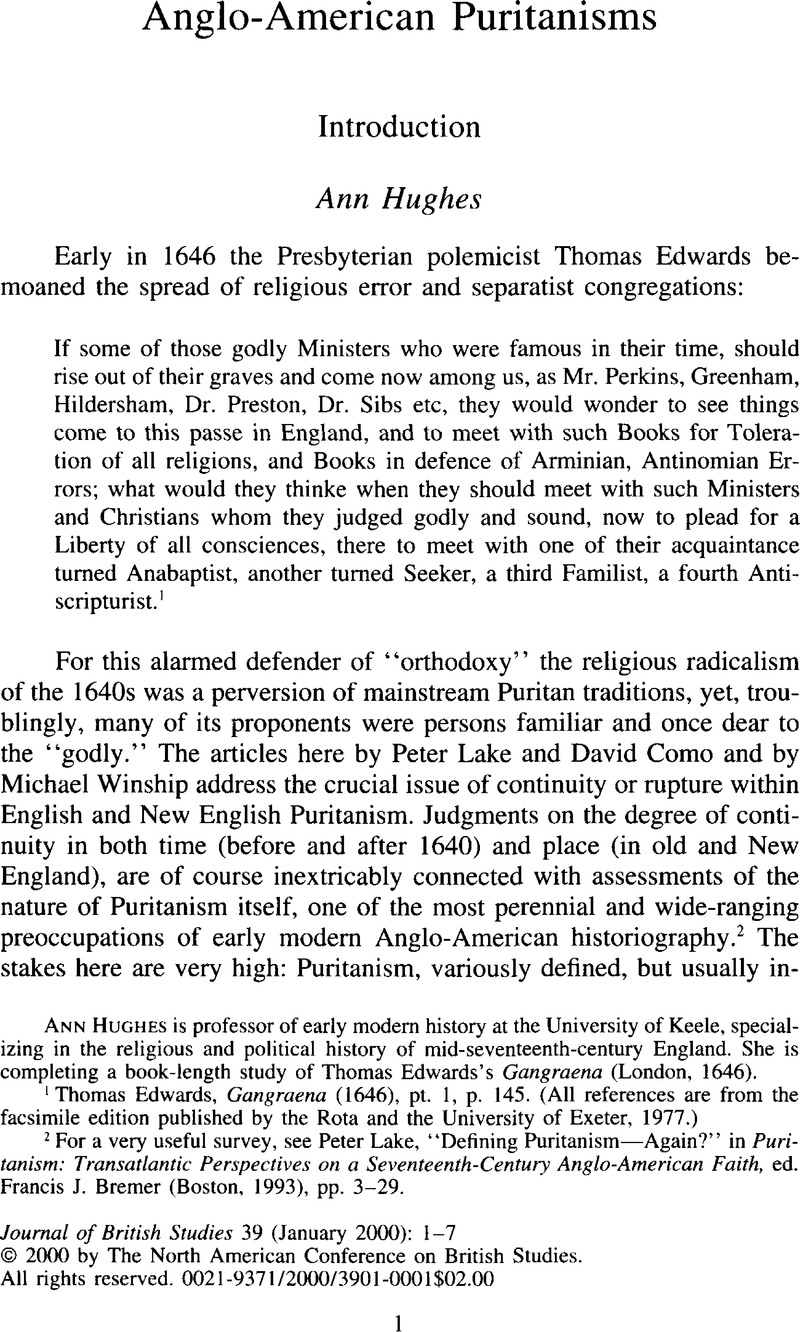Article contents
Abstract

- Type
- Introduction
- Information
- Journal of British Studies , Volume 39 , Issue 1: Anglo-American Puritanisms , January 2000 , pp. 1 - 7
- Copyright
- Copyright © North American Conference of British Studies 2000
References
1 Edwards, Thomas, Gangraena (1646), pt. 1, p. 145Google Scholar. (All references are from the facsimile edition published by the Rota and the University of Exeter, 1977.)
2 For a very useful survey, see Lake, Peter, “Defining Puritanism—Again?” in Puritanism: Transatlantic Perspectives on a Seventeenth-Century Anglo-American Faith, ed. Bremer, Francis J. (Boston, 1993), pp. 3–29Google Scholar.
3 For a recent introduction to some of these debates, see Lamont, William, Puritanism and Historical Controversy (London, 1996)Google Scholar.
4 The earlier view of an oppositional Puritan movement is presented in Haller, William, The Rise of Puritanism (New York, 1935)Google Scholar, and Liberty and Reformation in the Puritan Revolution (New York, 1955)Google Scholar. For Puritanism as part of the mainstream of English Protestantism, see Collinson, Patrick, The Religion of Protestants (Oxford, 1982)Google Scholar. For the “invention” of the stage Puritan, see Collinson, Patrick, “Ecclesiastical Vitriol: Religious Satire in the 1590s and the Invention of Puritanism,” in The Reign of Elizabeth, ed. Guy, John (Cambridge, 1995), pp. 150–70CrossRefGoogle Scholar.
5 Tyacke, Nicholas, “Puritanism, Arminianism and Counter-Revolution,” in The Origins of the English Civil War, ed. Russell, Conrad (New York, 1973), pp. 119–43CrossRefGoogle Scholar, has formed the inspiration for most of the arguments here.
6 See, in particular, Hill, Christopher, The World Turned Upside Down: Radical Ideas during the English Revolution (London, 1972)Google Scholar.
7 Lake, Peter, “‘A Charitable Christian Hatred’: The Godly and Their Enemies in the 1630s,” in The Culture of English Puritanism, 1560–1700, ed. Durston, Christopher and Eales, Jacqueline (Basingstoke, 1996), pp. 145–83CrossRefGoogle Scholar, quote at p. 183.
8 Lake, , “‘A Charitable Christian Hatred,’” pp. 154, 157Google Scholar, and “Defining Puritanism,” p. 10.
9 Saltmarsh, John, Groanes for Liberty (London, 1646), p. 5Google Scholar.
10 Goodwin, John, Cretensis or A Briefe Answer to an Ulcerous Treatise, Lately Published by Mr Thomas Edwards (London, 1646)Google Scholar.
11 Coffey, John, “Puritanism and Liberty Revisited: The Case for Toleration in the English Revolution,” Historical Journal 41, no. 4 (1998): 961–85CrossRefGoogle Scholar.
12 For important work that bridges the gaps between the mid-sixteenth century and the 1620s, stressing the importance of lay-clerical networks, see Tyacke, Nicholas, The Fortunes of English Puritanism, 1603–1640 (London, 1990)Google Scholar; and Eales, Jacqueline, “A Road to Revolution: The Continuity of Puritanism, 1559–1642,” in Durston, and Eales, , eds., Culture of English Puritanisms, pp. 184–209Google Scholar.
13 For further discussion, see Graham, Elspeth, “Authority, Resistance and Loss: Gendered Difference in the Writings of John Bunyan and Hannah Allen,” in John Bunyan and His England, 1628–88, ed. Laurence, Anne, Owens, W. Robert, and Sim, Stuart (Ronceverte, W.Va., 1990), pp. 115–30Google Scholar; Webster, Tom, “Writing to Redundancy: Approaches to Spiritual Journals and Early Modern Spirituality,” Historical Journal 39, no. 1 (1996): 33–56CrossRefGoogle Scholar.
14 For an attempt to reinvigorate the “Weber thesis” in a British context, see Marshall, Gordon, Presbyteries and Profits: Calvinism and the Development of Capitalism in Scotland (Oxford, 1980)Google Scholar; for skepticism, see Seaver, Paul, “The Puritan Work Ethic Revisited,” Journal of British Studies 19 (1980): 35–53CrossRefGoogle Scholar. Calhoun, Craig, ed., Habermas and the Public Sphere (Cambridge, Mass., and London, 1992)Google Scholar, deals with the role of religion in the development of a public sphere.
15 Edwards, , Gangraena, pp. 8, 41–42Google Scholar.
- 2
- Cited by


